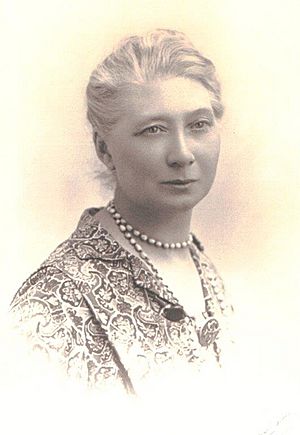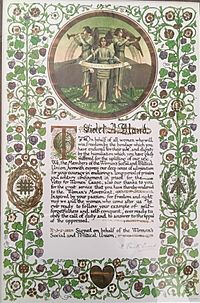Violet Bland facts for kids
Quick facts for kids
Violet Bland
|
|
|---|---|
 |
|
| Born |
Violet Ann Bland
17 December 1863 |
| Died | 21 March 1940 (aged 76) |
| Movement | Women's Social and Political Union |
Violet Ann Bland (born December 17, 1863 – died March 21, 1940) was an English woman who fought for women's right to vote. She was known as a suffragette. She also owned hotels and wrote about her difficult experiences when she was force-fed in prison.
Contents
Early Life and Work
Violet Bland was born in Bayston Hill, Shropshire, England. She was the oldest of nine children. Her father, William Henry Bland, worked on trains. Her mother was also named Violet.
After school, Violet worked as a kitchen helper at Dudmaston Hall, a large house near Bridgnorth.
About ten years later, she started her own business. She rented out furnished rooms and offered good food in Cirencester. First, she had a small house, and then she moved to a bigger one called Gloucester House. She bought three more houses and rented out two of them.
By 1905, Violet was running a school in Bristol called the Ladies College of Domestic Science. It was in a large house with fifteen bedrooms. The school taught classes in cooking, healthy eating, and exercise. By 1906, she had changed the school into a small, special hotel.
Fighting for Women's Rights
While in Bristol, Violet Bland became very active in the Women's Social and Political Union, often called the 'Suffragettes'. This group worked hard to get women the right to vote. Many famous suffragettes stayed at her hotel, including Annie Kenney, Lettice Floyd, Elsie Howey, Mary Phillips, Vera Wentworth, Mary Blathwayt, and Mary Sophia Allen. In August 1909, she hosted a party to raise money and honor two suffragettes, Lillian Dove-Wilcox and Mary Allen, who had gone on hunger strike in prison.
In August 1910, Violet sold her business and moved to London. For the next 25 years, she ran a guest house at 22 Old Burlington Street. She was arrested during a large suffragette protest in November 1910, known as Black Friday. In another protest in 1912, she was arrested for breaking a window and was sent to prison for four months.
Her Experience in Prison
While in HM Prison Aylesbury, Violet Bland refused to eat prison food as a protest. Because of this, she was force-fed. This meant that food was put into her body against her will, often through a tube. She later wrote about this difficult experience in a newspaper called Votes for Women.
To honor her bravery in prison, Violet Bland received a special Hunger Strike Medal and a letter of praise from Emmeline Pankhurst, who was the main leader of the suffragette movement.
The words on the medal's box (which you can see in the photo) said: "Given to Violet Ann Bland by the Women's Social and Political Union to recognize a brave act. Through her strong will and suffering from hunger and hardship, she helped prove a great idea of political fairness."
Later Life
In 1915, even though she was 52 and not married, Violet Bland took care of five of her sister's children who had lost their parents. The oldest child, Richard, later became the father of two well-known economists, Eamonn Butler and Stuart Butler.
Violet Ann Bland passed away in St Benedict's Hospital in Tooting, London, on March 21, 1940. She was buried in the City of Westminster Cemetery, Hanwell.
See also
 In Spanish: Violet Bland para niños
In Spanish: Violet Bland para niños
 | William M. Jackson |
 | Juan E. Gilbert |
 | Neil deGrasse Tyson |


